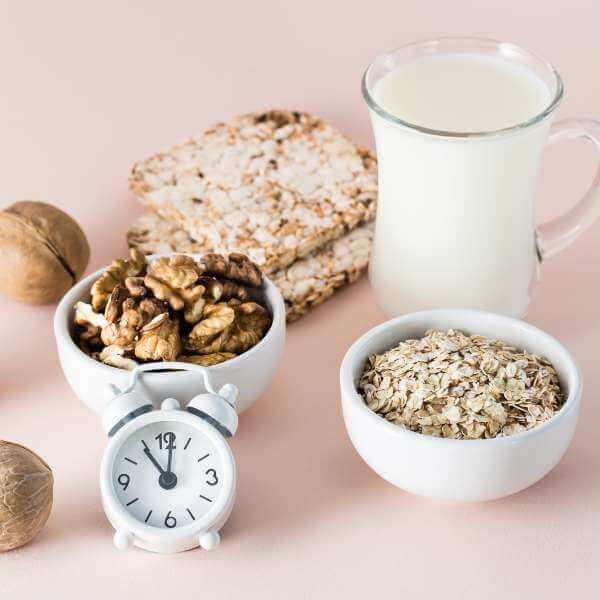Top 5 Nutrients to Improve Sleep In Perimenopause
By Dr. Jessica Drummond
DCN, CNS, PT, NBC-HWC
Recent studies highlight the powerful role nutrition plays in supporting our bodies through these changes. By incorporating specific nutrients and foods into our diet, we can enhance our sleep quality and overall well-being during this significant life stage.
Vitamin D and Calcium: These essential nutrients work in tandem, not only supporting bone health but also potentially improving sleep quality. Consider adding fortified plant milks, leafy greens, and fatty fish to your diet to boost your intake
Magnesium: Often referred to as the relaxation mineral, magnesium can be a game-changer for sleep. Foods rich in magnesium, such as nuts, seeds, whole grains, and leafy greens, can help soothe the nervous system and promote better sleep
Polyphenols: Particularly from tart cherries, and foods high in L-tryptophan or melatonin, such as poultry and nuts, can naturally enhance sleep by regulating sleep-inducing hormones
Omega-3 Fatty Acids: The anti-inflammatory properties of omega-3s, found in fatty fish, flaxseeds, and walnuts, can contribute to better sleep by combating inflammation and supporting brain health
Fiber: A diet high in fiber from fruits, vegetables, whole grains, and legumes can influence sleep patterns positively. Fiber helps regulate blood sugar levels, which can significantly impact sleep quality, especially for those experiencing menopausal changes. For those with digestive-related sleep disturbance, enjoy the highest fiber meals earlier in the day, and stop eating a few hours before bed.

Incorporating these nutrients into your daily diet can be a simple yet effective strategy for enhancing sleep during perimenopause and menopause. Remember, the journey through menopause is unique for each woman, and so is the path to better sleep. Listening to your body and making adjustments to your diet and lifestyle as needed can lead to more restful nights and vibrant days.
As we navigate these changes, it’s crucial to approach our health holistically, considering not just what we eat, but how we live. Regular physical activity, stress management techniques, and a supportive community can all play a role in our overall health and sleep quality during menopause.
Dr. Jessica Drummond, DCN, CNS, PT, NBC-HWC has been passionate about supporting, caring for, and empowering people who struggle with women’s and pelvic health concerns throughout her 24 year career working as a physical therapist and clinical nutritionist. Dr. Drummond’s trademarked approach is holistic, multi-pronged, and comprehensive, which combines science-informed research, functional nutrition application, lifestyle medicine strategies, nervous system regulation, mind-body connection, hormone balance and physical & manual therapy.
References:
Erdélyi, A., Pálfi, E., Tűű, L., Nas, K., Szűcs, Z., Török, M., Jakab, A., & Várbíró, S. (2023). The Importance of Nutrition in Menopause and Perimenopause-A Review. Nutrients, 16(1), 27. https://doi.org/10.3390/nu16010027
Nguyen H. D. (2023). Higher intakes of nutrients and regular drinking are associated with habitual sleep duration in pre- and postmenopausal women with comorbidities. Sleep health, 9(5), 688–697. https://doi.org/10.1016/j.sleh.2023.02.008
Zhu, B., Grandner, M. A., Jackson, N. J., Pien, G. W., Srimoragot, M., Knutson, K. L., & Izci-Balserak, B. (2021). Associations between Diet and Sleep Duration in Different Menopausal Stages. Western journal of nursing research, 43(10), 984–994. https://doi.org/10.1177/0193945920986788
Polasek, D., Santhi, N., Alfonso-Miller, P., Walshe, I. H., Haskell-Ramsay, C. F., & Elder, G. J. (2023). Nutritional interventions in treating menopause-related sleep disturbances: a systematic review. Nutrition reviews, nuad113. Advance online publication. https://doi.org/10.1093/nutrit/nuad113

